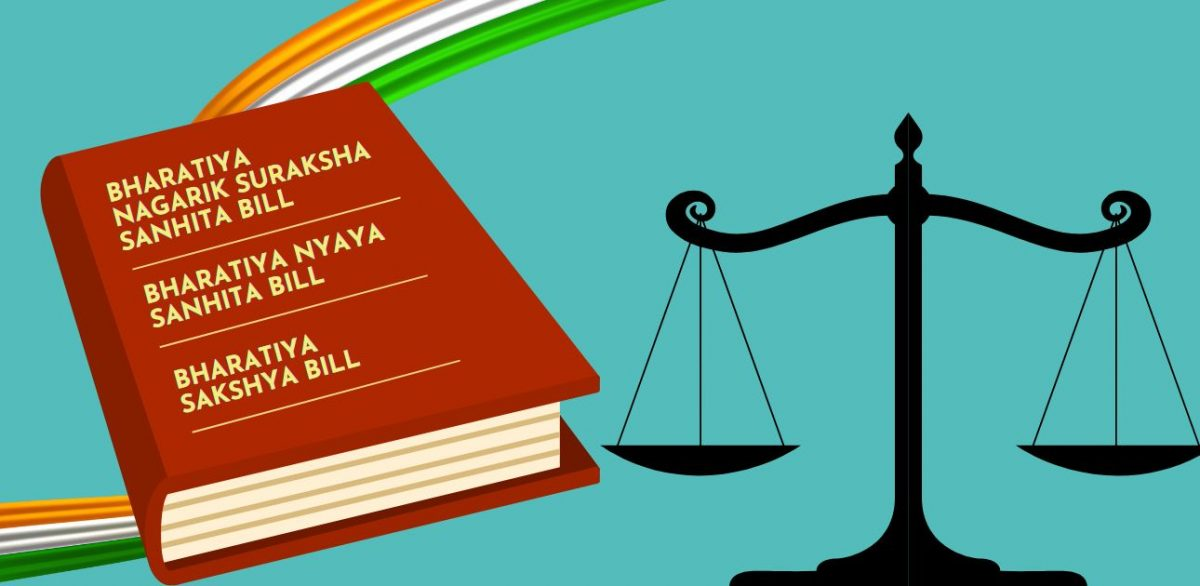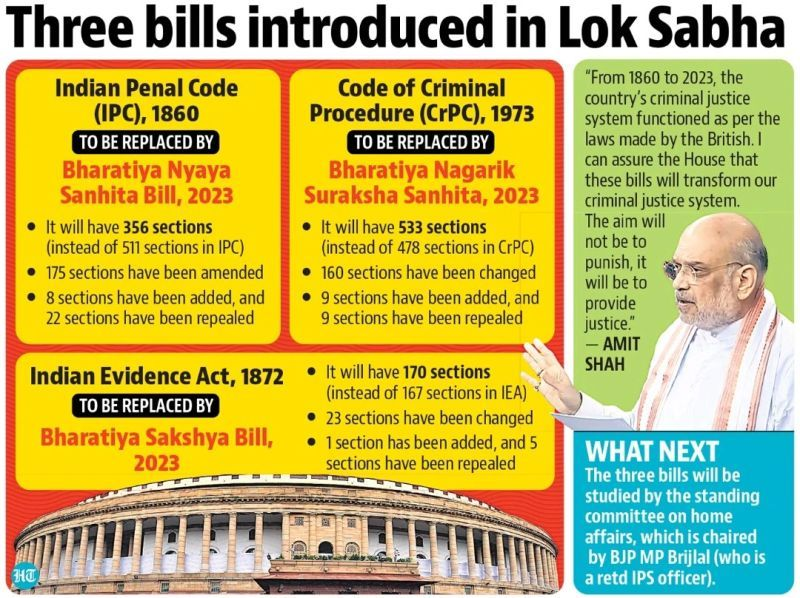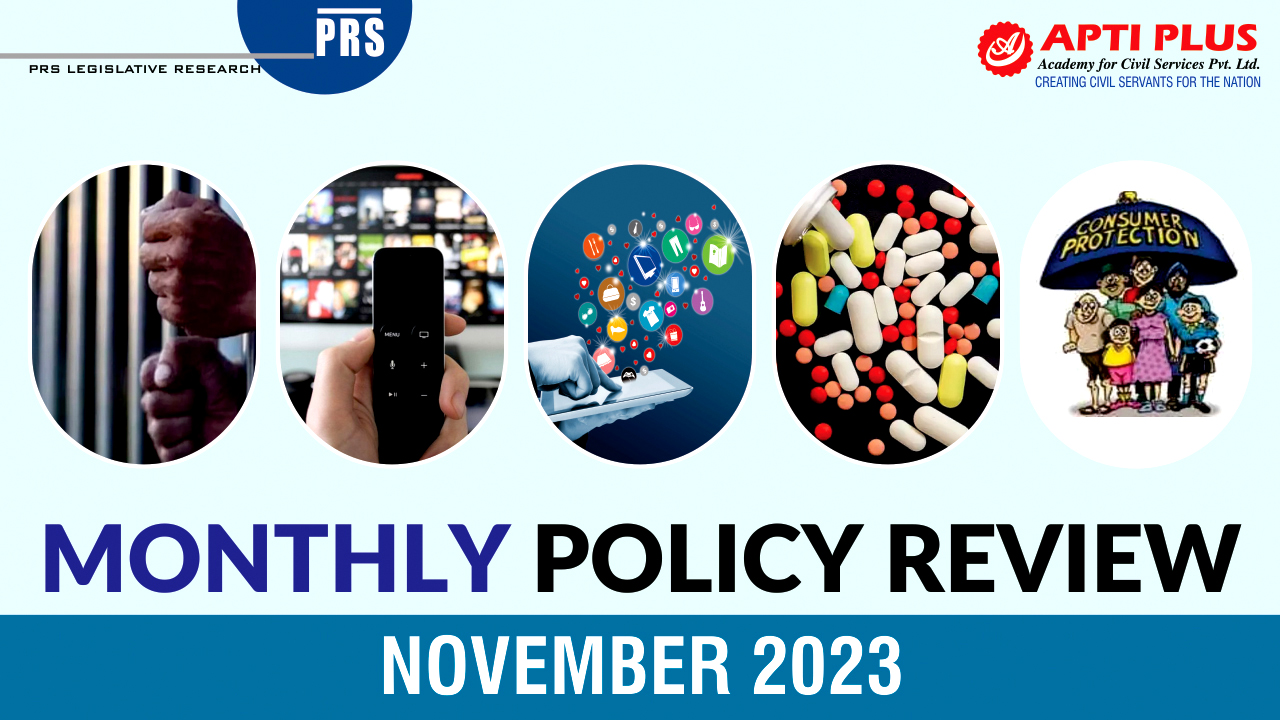
Copyright infringement not intended
Picture Courtesy: www.newsclick.in
Context: The revised versions of Bharatiya Nyaya Sanhita, Bharatiya Nagarik Suraksha Sanhita, and Bharatiya Sakshya Bill were reintroduced in Parliament after undergoing amendments suggested by the Parliamentary Standing Committee on Home Affairs.
Details
- The Union Government introduced three Bills in Lok Sabha in August 2023, to replace the Indian Penal Code (IPC), 1860; the Code of Criminal Procedure, 1973 (originally enacted in 1898); and the Indian Evidence Act, 1872.
- The new Bills—Bharatiya Nyaya Sanhita (BNS), 2023, to replace the IPC; Bharatiya Nagarik Suraksha Sanhita (BNSS), 2023, for CrPC; and Bharatiya Sakshya (BS) Bill, 2023, for the Indian Evidence Act—were subsequently referred to a standing committee the same day.
- The committee proposed several key changes to the Bills. Subsequently, the Centre re-introduced the revamped criminal law Bills in Parliament’s winter session.
- These modifications aimed to address the committee's concerns and improve the precision, fairness, and applicability of the laws concerning various criminal activities.
Changes made in the revised criminal reform bills
Handcuffs
- Initial Proposal: The Bharatiya Nagarik Suraksha Sanhita (BNSS) initially allowed the use of handcuffs during arrests for individuals accused of serious offences, including "economic offences."
- Committee's Recommendation: The committee suggested restricting the use of handcuffs to select heinous crimes like rape and murder, excluding economic offences due to their varying severity. They recommended deleting "economic offences" from the clause.
- Incorporated Change: The revised bill deleted "economic offences" from the clause and made the use of handcuffs for offences against the state more discretionary. It also extended the use of handcuffs to individuals being produced before a court.
Mercy Petitions
- Initial Provision: The BNSS allowed convicts facing death sentences or their relatives to file mercy petitions, subject to review by the Centre or state government's Home Department.
- Committee's Recommendation: The committee proposed establishing a quasi-judicial board for mercy petitions and setting a timeframe for their review.
- Incorporated Change: The provision allowing mercy petitions to be forwarded for review was deleted. Additionally, the scope of non-appealable orders under Articles 72 and 161 was broadened, making the Governor's orders under Article 161 unappealable.
Preventive Detention Powers
- Initial Expansion: The BNSS expanded police powers for preventive action without specifying a time frame for detention.
- Committee's Recommendation: The committee suggested specifying a time period for detention and clarifying ambiguous language.
- Incorporated Change: The new bill includes a 24-hour limit for detention and clarifies the use of the term "Magistrate" instead of "judicial magistrate."
Community Service
- Initial Provision: "Community service" was included as a penalty for specific offences without a clear definition.
- Committee's Recommendation: Define "community service" and extend its application to specific offences.
- Incorporated Change: The revised BNSS now defines "community service" as court-ordered work benefiting the community without remuneration. Additionally, community service was extended as a punishment for unlawfully engaging public servants in trade and non-appearance in response to a proclamation under Section 84.

The Bharatiya Nyaya Sanhita 2023
- It is a proposed bill aiming to replace the Indian Penal Code of 1860. This bill introduces several changes in criminal offences and punishments.
- It covers a wide range of aspects, including terrorism, organised crime, sexual offences, and more.
Key changes proposed in this bill include:
Sedition
- The Indian Penal Code (IPC) defines sedition as bringing or attempting to bring hatred or contempt, or exciting disaffection towards the government.
- The Bill removes sedition as an offence and replaces it with penalties for activities such as exciting or attempting to excite secession, armed rebellion, subversive activities, encouraging separatist feelings, or endangering the sovereignty or unity of India.
- Offences under the new provisions may result in imprisonment of up to seven years or life imprisonment, along with a fine.
Terrorism
- The Bill defines terrorism as acts intending to threaten the unity, integrity, and security of the country, intimidate the public, or disturb public order.
- Includes the use of firearms, bombs, hazardous substances, destroying property, disrupting essential services, and activities listed in the Unlawful Activities (Prevention) Act, 1967.
- Death or life imprisonment for acts resulting in death, imprisonment term between five years and life in other cases. Offenders may also face a fine of at least five lakh rupees.
- Conspiring, organizing, or assisting in preparing any terrorist act carries imprisonment between five years and life, along with a fine.
Organized Crime
- Continuing unlawful activities such as kidnapping, extortion, contract killing, land grabbing, financial scams, and cybercrime, carried out by violence or intimidation for material or financial benefit, by individuals or crime syndicates.
- Death or life imprisonment for offences resulting in death, imprisonment term between five years and life in other cases, along with a fine.
Petty Organized Crime
- Organized crimes cause general feelings of insecurity, committed by criminal groups/gangs, including pickpocketing, snatching, and theft.
- Attempting or committing petty organized crime is punishable with imprisonment between one and seven years and a fine.
Murder on Grounds of Caste or Race
- Murder committed by five or more people on specified grounds (race, caste, sex, place of birth, language, or personal belief) is punishable with imprisonment between seven years and life, or death, along with a fine.
Death Penalty for Gang Rape of Minors
- The bill extends the provision of the death penalty for gang rape to include victims under 18 years of age, broadening the scope beyond the previous provision which applied to victims below 12 years of age under the Indian Penal Code.
Sexual Intercourse by Deceitful Means
- This provision criminalizes sexual intercourse with a woman through deceit or a false promise of marriage without intending to fulfil it. The punishment could range from simple to rigorous imprisonment for up to 10 years, coupled with a fine.
Extending Offenses to Boys
- The Bill specifies that importing boys under the age of 18 years for illicit intercourse with another person will be an offence. This provision aligns the law with a gender-neutral approach concerning certain offences related to illicit activities involving minors.

The Bharatiya Nagarik Suraksha Sanhita 2023
- The new legislation aims to replace the Code of Criminal Procedure, 1973. The Bill preserves most of the provisions of the Code of Criminal Procedure, 1973, but also introduces some changes and reforms.
- The Code of Criminal Procedure, 1973 is the existing law that governs the process of arrest, trial, and bail for criminal offences under various laws such as the Indian Penal Code, 1860.
Key changes proposed under the bill include:
Detention of Undertrials
- Under the current Code, if an accused spends half of the maximum imprisonment period during investigation or trial, release on personal bond is mandated. The new bill modifies this, excluding release for offences punishable by life imprisonment or when facing multiple proceedings.
- First-time offenders may secure bail after completing one-third of the maximum imprisonment for the offence, necessitating an application by the jail superintendent.
Electronic Trials
- The Bill proposes that legal proceedings, including trials and inquiries, can be conducted in electronic mode. This means that court proceedings could take place through digital platforms or electronic communication systems.
- It allows for the production of electronic communication devices, such as mobile phones and computers, as potential sources of digital evidence during investigations or trials.
Medical Examination of Accused
- The existing legal framework allows the medical examination of accused individuals in specific cases, like rape, but limits the request for such examinations to at least a sub-inspector level police officer.
- The Bill suggests expanding this authority to any police officer, providing more flexibility in initiating medical examinations.
Forensic Investigation
- The Bill mandates forensic investigation for offences carrying a minimum punishment of seven years of imprisonment.
- It ensures that forensic experts visit crime scenes to collect evidence, and the entire process is documented using electronic devices. If a state lacks forensic facilities, it can utilize facilities in another state.
Prohibition of Carrying Arms
- The existing legal provision empowers District Magistrates to prohibit the carrying of arms in certain public situations for up to six months. The Bill proposes to omit this provision, possibly for reasons related to its non-notification or perceived redundancy.
Signatures, Finger Impressions, and Voice Samples
- The Bill expands the powers of Metropolitan/Judicial Magistrates to order the provision of not just specimen signatures and handwriting but also finger impressions and voice samples.
- Importantly, this can be done even for individuals who have not been arrested, broadening the scope of the magistrate's authority.
Timelines for Procedures
- The Bill introduces specific timelines for various legal procedures, such as the submission of medical reports within seven days for cases involving rape victims.
- It sets timeframes for giving judgments, informing victims of investigation progress, and framing charges in session courts.
Trial in Absence of Offender
- The Bill allows for the conduct of trials and pronouncement of judgments in the absence of a proclaimed offender. This is applicable when the accused person has evaded trial, and there's no immediate prospect of their arrest.
Metropolitan Magistrates
- The Bill omits the provision related to the notification of metropolitan areas and the appointment of Metropolitan Magistrates in cities or towns with a population exceeding one million. The reasons for this omission are not explicitly mentioned.

The Bhartiya Sakshya Bill 2023
- The proposal aimed at modernizing the rules governing the admissibility of evidence in legal proceedings in India. By repealing the Indian Evidence Act, 1872, it indicates an intent to update and adapt these rules to contemporary contexts.
Admissibility of electronic or digital records as evidence
- The bill aims to update the definition of documentary evidence to include electronic or digital records. It expands the scope to encompass information stored in various devices like smartphones, laptops, server logs, and even voice mails. This change essentially equates the legal effect of electronic records to that of paper records.
Oral evidence
- The proposed bill extends the definition of oral evidence to include information given electronically, acknowledging that statements made electronically can be considered as oral evidence.
Secondary evidence
- The bill expands the definition of secondary evidence. While primary evidence includes original documents and their electronic counterparts, secondary evidence now includes oral and written admissions, as well as the testimony of an expert in examining documents.
- It clarifies that secondary evidence might be necessary not only when the original document is inaccessible but also when the genuineness of the document is in question.
Production of documents
- The bill specifies that while witnesses summoned to produce documents must do so, the court will not demand privileged communications between Ministers and the President to be produced before it. This safeguards certain types of communications from mandatory production in court.
Joint trials
- In the context of joint trials involving multiple accused individuals, the bill elaborates on the treatment of confessions made by one accused that implicate others. It also clarifies that trials involving multiple individuals will still be considered joint trials even if one accused is absent or has not responded to an arrest warrant.
Conclusion
- The success of these bills in achieving their intended outcomes will depend on effective implementation, ongoing evaluation, and responsiveness to emerging challenges. Public awareness and engagement will also play a crucial role in ensuring the success of these reforms.
Must Read Articles:
Overhaul of British-Era Criminal Laws: https://www.iasgyan.in/daily-current-affairs/overhaul-of-british-era-criminal-laws
|
PRACTICE QUESTION
Q. What were the key challenges and transformations involved in the comprehensive overhaul of British-era criminal laws in India, and how has this reshaping impacted the country's legal system and societal perspectives on justice?
|
















